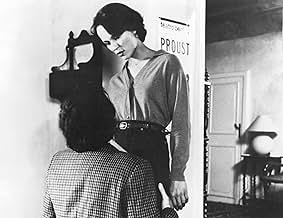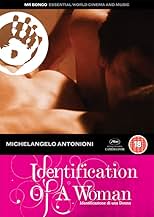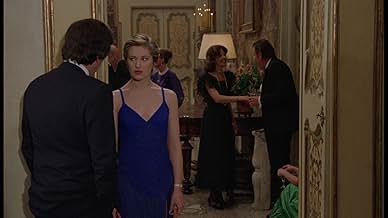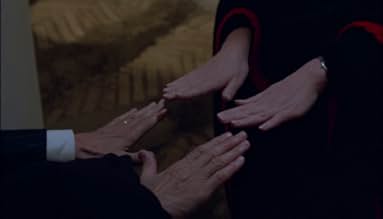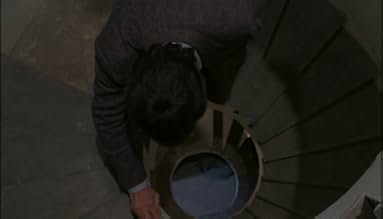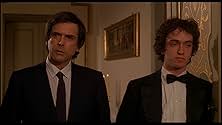IMDb RATING
6.6/10
3.5K
YOUR RATING
A director's wife leaves him. He pursues another woman who also departs. This inspires a movie idea about women's relationships. He searches for an actress to star in the film and his life.A director's wife leaves him. He pursues another woman who also departs. This inspires a movie idea about women's relationships. He searches for an actress to star in the film and his life.A director's wife leaves him. He pursues another woman who also departs. This inspires a movie idea about women's relationships. He searches for an actress to star in the film and his life.
- Awards
- 1 win & 5 nominations total
Enrica Antonioni
- Nadia
- (as Enrica Fico)
Giampaolo Saccarola
- The Gorilla
- (as Gianpaolo Saccarola)
Dado Ruspoli
- Mavi's Father
- (as Alessandro Ruspoli)
Pier Francesco Aiello
- Young Man at Party
- (as Pierfrancesco Aiello)
Carlos Alberto Valles
- Close-Up Man
- (as Carlos Valles)
Featured reviews
First the good. The fog scene. OMG. Incredible. Even if you decide to skip this movie, you should try to find that scene and watch it. Next the bad: ouch dude my brain hurts.
"Identification of a Woman" was the last feature film by master director Michelangelo Antonioni before he suffered a debilitating stroke and lost his ability to communicate. It was also his long-awaited, eagerly-anticipated salivatorily-received return to the cinema of his native Italy after some 15 years making films in the UK & USA. This is a landmark for the fans, and as far as that goes I am... how does one say "fanboi" in Italian?
But wow, this is a difficult film.
Although the story is easy enough to follow (a director searches for the perfect female character for his latest movie whilst personally going through several women in his life), the plot is not the main focus of the movie. Rather, the main focus is on Antonioni's style of storytelling which has always been cryptic and deliberately confounding.
In this case it can be outright frustrating or even infuriating. This is because, unlike Antonioni's earlier Italian works that you probably love him for ("L'avventura", "La notte", "L'eclisse", "Red Desert"), here of course we don't have the wonderfully human Monica Vitti or any of the other interesting characters such as L;eclisse's boy-faced charmer Alain Delon or Red Desert's broodingly introspective Richard Harris. Here the characters are all deliberately wooden personifications of social tiers and personality types. While, yes, that successfully shifts focus to the theme of the film, it makes for a difficult movie watching experience.
Further complicating the experience are some explicit sexual scenes which can be disturbing to watch (a scene of a man aggressively pleasuring a woman with his hand, leaving nothing to the imagination) which was undoubtedly Antonioni's deliberate embracing of the new sexually explicit cinematic style of the 80s. Indeed, a prominent theme in many of his works is that new ways must be forcefully embraced even at the expense of losing our traditions.
So it all fits with what he's saying here. I won't argue with his presentation. I'll just say, wow that was difficult. Other reviewers have noted that you really have to watch this film twice. I'm sure I'll give it another go soon enough. I just need to rest my brain first.
"Identification of a Woman" was the last feature film by master director Michelangelo Antonioni before he suffered a debilitating stroke and lost his ability to communicate. It was also his long-awaited, eagerly-anticipated salivatorily-received return to the cinema of his native Italy after some 15 years making films in the UK & USA. This is a landmark for the fans, and as far as that goes I am... how does one say "fanboi" in Italian?
But wow, this is a difficult film.
Although the story is easy enough to follow (a director searches for the perfect female character for his latest movie whilst personally going through several women in his life), the plot is not the main focus of the movie. Rather, the main focus is on Antonioni's style of storytelling which has always been cryptic and deliberately confounding.
In this case it can be outright frustrating or even infuriating. This is because, unlike Antonioni's earlier Italian works that you probably love him for ("L'avventura", "La notte", "L'eclisse", "Red Desert"), here of course we don't have the wonderfully human Monica Vitti or any of the other interesting characters such as L;eclisse's boy-faced charmer Alain Delon or Red Desert's broodingly introspective Richard Harris. Here the characters are all deliberately wooden personifications of social tiers and personality types. While, yes, that successfully shifts focus to the theme of the film, it makes for a difficult movie watching experience.
Further complicating the experience are some explicit sexual scenes which can be disturbing to watch (a scene of a man aggressively pleasuring a woman with his hand, leaving nothing to the imagination) which was undoubtedly Antonioni's deliberate embracing of the new sexually explicit cinematic style of the 80s. Indeed, a prominent theme in many of his works is that new ways must be forcefully embraced even at the expense of losing our traditions.
So it all fits with what he's saying here. I won't argue with his presentation. I'll just say, wow that was difficult. Other reviewers have noted that you really have to watch this film twice. I'm sure I'll give it another go soon enough. I just need to rest my brain first.
10Xanadu-2
A very beautiful film with that special Antonioni atmosphere. I can identify with the feeling of emptiness and the people who can´t really communicate with each other. Modern life and adulthood seems shallow and a bit soulless. You have to fill it with something and make it human again.
The first time I saw it I was disapointed but it improved greatly with the second viewing and I want to see it again. There are new things to discover each time as with all of Antonionis´ films.
The first time I saw it I was disapointed but it improved greatly with the second viewing and I want to see it again. There are new things to discover each time as with all of Antonionis´ films.
I think there are no such things as popular movies or intellectual films. there are good films and bad ones. Whether they are westerns, film noirs, comedies or action movies is irrelevant. some of them speak to you as if you were a nut-head, others as if you were able to share their vision and if necessary think by yourself, not mentioning others who would simply insult a 5-year old. This movie definitely falls in the second category. First of all it is visually rewarding. Antonioni is a painter in films and every scene, every shot is beautiful and interesting. As to the plot and characters, they are puzzling, for, as in all Antonioni's movies, they never act or react as expected. There is mystery, in every scene. It is so modern that not many films of today can compete. The love scene for instance is unrivaled in today's cinema and makes "Basic Instinct" look like sexual excitation seen through the eye of mickey Mouse. It's a film about creation, fatherhood, what it is to watch and to be watched. it's about cinema!
Antonioni's last film prior to his suffering a stroke is this very typical effort (co-written with Gerard Brach and Tonino Guerra), dealing with a number of key themes that run through his work – lack of communication, the mystery-as-journey-of-self-discovery, etc. That said, the film wasn't picked up for U.S. release until 1996 and is consequently perhaps the least-seen of Antonioni's films from his post-AVVENTURA phase!
Anyway, the mystery element links the film with the director's earlier BLOW UP (1966) and THE PASSENGER (1975); still, it's never as intriguing here as in those more celebrated titles (especially since, for once, it's explained away at the end!) but, as I said, the film eventually emerges to be more about the mid-life crisis of its central character (despite the title). Interestingly, he's a film director – though "Euro-Cult" favorite Tomas Milian feels as incongruous to Antonioni's cinema as Marcello Mastroianni's presence had been in LA NOTTE (1961)! He has an obsessive relationship with a young woman (even enjoying some LAST TANGO IN Paris [1972]-type sex scenes!) who eventually leaves him and disappears (shades also of L'AVVENTURA [1960]); while searching for her, he meets a variety of other willing girls (among them Antonioni's own future wife Enrica Fico). Marcel Bozzuffi appears in one brief, irrelevant scene as Milian's brother.
Overall, the film is tiresomely long and often mirrors the tedium experienced by the characters; the ending, however, is a beauty – suggesting that, even if he's a failure at love, a film director is still left with his imagination. Carlo Di Palma's cinematography is notable, too – particularly at the Venice location (where, coincidentally, I saw the Antonionis three years ago!) and during the tense fog-bound sequence; the film's score, then, is a mix of electronic, ambient and pop – and all very much of its period. As was the case with THE PASSENGER, THE MYSTERY OF OBERWALD (which is now one of only two features by the director I've yet to catch up with!) and BEYOND THE CLOUDS (1995), Antonioni had a hand in the editing of the film; here, he receives sole credit for this and the result makes especially effective use of ellipses (the factors of time and space had always been a primary concern in his work – thus making the apparently mocking recourse to science-fiction at the end anything but coincidental!).
Anyway, the mystery element links the film with the director's earlier BLOW UP (1966) and THE PASSENGER (1975); still, it's never as intriguing here as in those more celebrated titles (especially since, for once, it's explained away at the end!) but, as I said, the film eventually emerges to be more about the mid-life crisis of its central character (despite the title). Interestingly, he's a film director – though "Euro-Cult" favorite Tomas Milian feels as incongruous to Antonioni's cinema as Marcello Mastroianni's presence had been in LA NOTTE (1961)! He has an obsessive relationship with a young woman (even enjoying some LAST TANGO IN Paris [1972]-type sex scenes!) who eventually leaves him and disappears (shades also of L'AVVENTURA [1960]); while searching for her, he meets a variety of other willing girls (among them Antonioni's own future wife Enrica Fico). Marcel Bozzuffi appears in one brief, irrelevant scene as Milian's brother.
Overall, the film is tiresomely long and often mirrors the tedium experienced by the characters; the ending, however, is a beauty – suggesting that, even if he's a failure at love, a film director is still left with his imagination. Carlo Di Palma's cinematography is notable, too – particularly at the Venice location (where, coincidentally, I saw the Antonionis three years ago!) and during the tense fog-bound sequence; the film's score, then, is a mix of electronic, ambient and pop – and all very much of its period. As was the case with THE PASSENGER, THE MYSTERY OF OBERWALD (which is now one of only two features by the director I've yet to catch up with!) and BEYOND THE CLOUDS (1995), Antonioni had a hand in the editing of the film; here, he receives sole credit for this and the result makes especially effective use of ellipses (the factors of time and space had always been a primary concern in his work – thus making the apparently mocking recourse to science-fiction at the end anything but coincidental!).
This is probably obvious, but if you don't like Antonioni, stay away from Identification of a Woman. If you've never seen another, check out one of these films first: L'Avventura, La Notte, L'Eclisse, Red Desert, Blowup, The Passenger, or Zabriskie Point. If you are a fan of Antonioni, like myself, please do check out this film. It is definitely one of Antonioni's weaker films, but it is still undeniably in his style and containing his regular themes. This one is about a film director who can be said to fall in love with a woman (who, incidentally, looks a lot like a very young and extraordinarily thin version of Monica Vitti), but he can't express that love. The woman is upset at this and disappears. In some ways, this is like a weaker version of L'Avventura. The man tries to get on with his life, begins dating again, but eventually realizes that his mind revolves around the girl who abandoned him. This film is disappointing, especially if you're in love with Antonioni the director. The direction is generally flat. Only a few scenes show his supreme visual style. 6/10.
Did you know
- TriviaThe last feature film Michelangelo Antonioni made before his debilitating stroke.
- ConnectionsFeatured in Tonino Guerra: A Poet in the Movies (2008)
- SoundtracksThe Fire Inside
Written by Steve Hillage and Monique Giraudy (as Miquette Giraudy)
Performed by Steve Hillage
Published by Virgin Music Publishers
- How long is Identification of a Woman?Powered by Alexa
Details
- Release date
- Countries of origin
- Languages
- Also known as
- Identification of a Woman
- Filming locations
- Production companies
- See more company credits at IMDbPro
Box office
- Gross worldwide
- $1,605
Contribute to this page
Suggest an edit or add missing content

